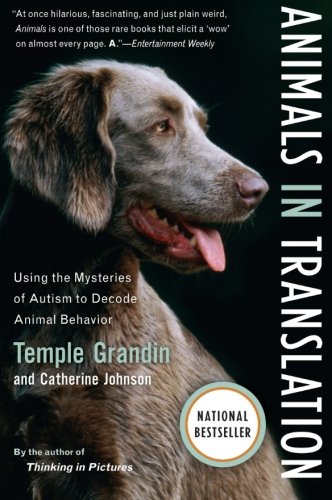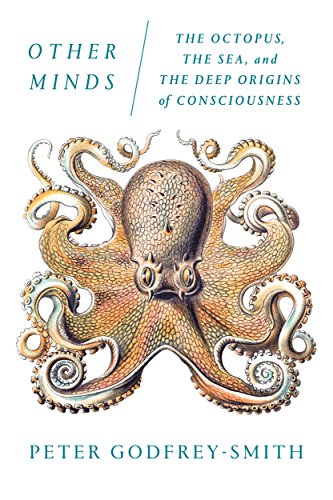
|
|
Product Description
I don't know if people will ever be able to talk to animals the way Doctor Doolittle could, or whether animals will be able to talk back. Maybe science will have something to say about that. But I do know people can learn to "talk" to animals, and to hear what animals have to say, better than they do now. --From Animals in Translation
Why would a cow lick a tractor? Why are collies getting dumber? Why do dolphins sometimes kill for fun? How can a parrot learn to spell? How did wolves teach man to evolve? Temple Grandin draws upon a long, distinguished career as an animal scientist and her own experiences with autism to deliver an extraordinary message about how animals act, think, and feel. She has a perspective like that of no other expert in the field, which allows her to offer unparalleled observations and groundbreaking ideas.
People with autism can often think the way animals think, putting them in the perfect position to translate "animal talk." Grandin is a faithful guide into their world, exploring animal pain, fear, aggression, love, friendship, communication, learning, and, yes, even animal genius. The sweep of Animals in Translation is immense and will forever change the way we think about animals.
*includes a Behavior and Training Troubleshooting Guide
Among its provocative ideas, the book:
argues that language is not a requirement for consciousness--and that animals do have consciousness applies the autism theory of "hyper-specificity" to animals, showing that animals and autistic people are so sensitive to detail that they "can't see the forest for the trees"--a talent as well as a "deficit" explores the "interpreter" in the normal human brain that filters out detail, leaving people blind to much of the reality that surrounds them--a reality animals and autistic people see, sometimes all too clearlyexplains how animals have "superhuman" skills: animals have animal geniuscompares animals to autistic savants, declaring that animals may in fact be autistic savants, with special forms of genius that normal people do not possess and sometimes cannot even see examines how humans and animals use their emotions to think, to decide, and even to predict the future reveals the remarkable abilities of handicapped people and animals maintains that the single worst thing you can do to an animal is to make it feel afraid
Why would a cow lick a tractor? Why are collies getting dumber? Why do dolphins sometimes kill for fun? How can a parrot learn to spell? How did wolves teach man to evolve? Temple Grandin draws upon a long, distinguished career as an animal scientist and her own experiences with autism to deliver an extraordinary message about how animals act, think, and feel. She has a perspective like that of no other expert in the field, which allows her to offer unparalleled observations and groundbreaking ideas.
People with autism can often think the way animals think, putting them in the perfect position to translate "animal talk." Grandin is a faithful guide into their world, exploring animal pain, fear, aggression, love, friendship, communication, learning, and, yes, even animal genius. The sweep of Animals in Translation is immense and will forever change the way we think about animals.
*includes a Behavior and Training Troubleshooting Guide
Among its provocative ideas, the book:
argues that language is not a requirement for consciousness--and that animals do have consciousness applies the autism theory of "hyper-specificity" to animals, showing that animals and autistic people are so sensitive to detail that they "can't see the forest for the trees"--a talent as well as a "deficit" explores the "interpreter" in the normal human brain that filters out detail, leaving people blind to much of the reality that surrounds them--a reality animals and autistic people see, sometimes all too clearlyexplains how animals have "superhuman" skills: animals have animal geniuscompares animals to autistic savants, declaring that animals may in fact be autistic savants, with special forms of genius that normal people do not possess and sometimes cannot even see examines how humans and animals use their emotions to think, to decide, and even to predict the future reveals the remarkable abilities of handicapped people and animals maintains that the single worst thing you can do to an animal is to make it feel afraid
Customers Who Bought This Item Also Bought
- The Man Who Listens to Horses: The Story of a Real-Life Horse Whisperer
- Some We Love, Some We Hate, Some We Eat: Why It's So Hard to Think Straight About Animals (P.S.)
- Thinking in Pictures, Expanded Edition: My Life with Autism
- The Autistic Brain
- Animals Make Us Human
- How to Think Like A Horse: The Essential Handbook for Understanding Why Horses Do What They Do
- Temple Grandin's Guide to Working with Farm Animals: Safe, Humane Livestock Handling Practices for the Small Farm
- The Loving Push: How Parents and Professionals Can Help Spectrum Kids Become Successful Adults
- The Way I See It: A Personal Look at Autism & Asperger's: Revised & Expanded, 4th Edition
- Unwritten Rules of Social Relationships: Decoding Social Mysteries Through the Unique Perspectives of Autism: New Edition with Author Updates
*If this is not the "Animals in Translation: Using the Mysteries of Autism to Decode Animal Behavior (A Harvest Book)" product you were looking for, you can check the other results by clicking this link







